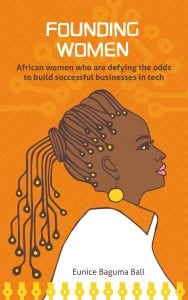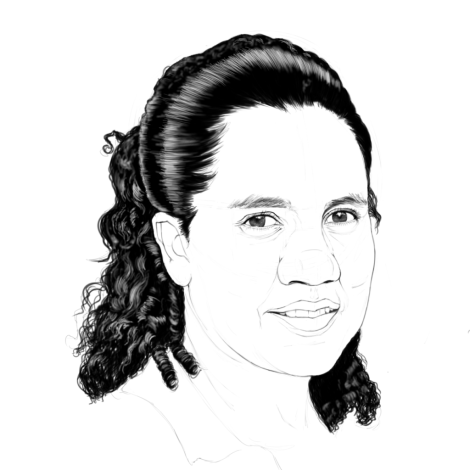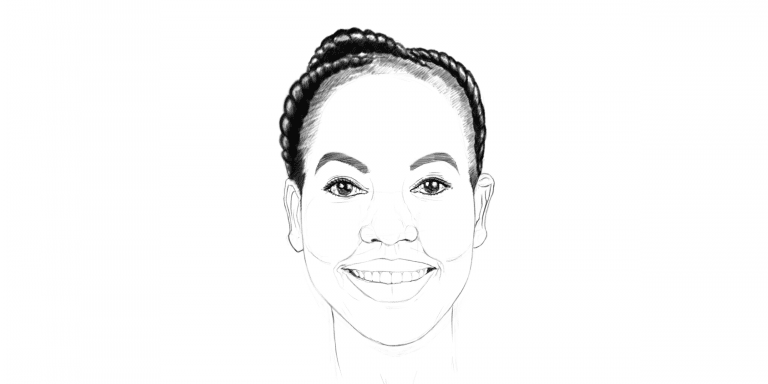 The following is an excerpt from the book Founding Women: African Women Who Are Defying the Odds to Build Successful Businesses in Tech. Printed here with permission.
The following is an excerpt from the book Founding Women: African Women Who Are Defying the Odds to Build Successful Businesses in Tech. Printed here with permission.
Aline Saraiva Okello
Co-Founder, HarvestRainWater | Mozambique
Aline is a Civil Engineer. PhD researcher and social entrepreneur. She is the Co-Founder of HarvestRainWater, an app designed to help communities prevent water shortages by building systems that collect and preserve rainwater. She has been recognized through a number of awards, including the l’Oreal-UNESCO Fellowship for Women in Science. Faculty of the Future Fellowship and the Royal Academy of Engineering Africa Prize. Below she speaks about balancing life as an academic, an entrepreneur and a mum.
How did you end up studying engineering?
As a young girl, l was always good at science subjects like math and physics. My Dad noticed this and encouraged me to pursue engineering. On a personal level I’ve always been drawn to the idea of building stuff and was fascinated by things like bridges. it’s therefore not surprising that I ended up studying civil engineering. This turned out to be challenging because at the time, particularly in Mozambique where l grew up, engineering was still very much viewed as a man’s field. In my class of about thirty students. We were only five women and by the end of the course, l was the only one who graduated on time. The other ladies did eventually graduate but it was quite challenging for all of us, given how few we were, to stay motivated when we felt out of place most of the time. Thankfully, this is starting to change. I’ve taught some Civil Engineering classes now where the gender balance is almost fifty-fifty. I think this is very important because as more women enter the engineering field, they become role models who can show young girls that it’s possible.
Want more on Founding Women? Please see Origins of a Startup: The Mechanical Engineer Nneile Nkholise Founded iMed Tech in South Africa
How did you come to be both an academic and an entrepreneur?
After completing my Civil Engineering degree in Mozambique, I traveled to the Netherlands for my Masters in water science at UN-IHE Delft. I was amazed by the amount of knowledge and technology solutions they had for similar problems to the ones we faced back home. l had no idea that some of these solutions were already out there and seeing how knowledge could be applied to solve real problems inspired me to pursue a PhD. However, during my PhD journey, I realized that when you pursue an academic career, you communicate mostly with people who are also within academia. You go to conferences and seminars but the knowledge may not trickle down to the people who really need it on the ground. I wanted to make a difference. And looking at the current drought situation in Southern Africa, I thought about how I could be a part of the solution. That is when some friends and I came up with the idea for the HarvestRainWater App. The goal of the app is to help communities prevent water shortages by building systems that collect and preserve rainwater. We saw that people were already trying to do this but they lacked sufficient knowledge on the best materials to use. We also saw that there was a business opportunity in creating a “one stop shop” for rain water harvesting, whereby suppliers of these materials could list them on the app. This is how I got into the world of entrepreneurship. I started out purely in academia but then I realized through entrepreneurship I could put my knowledge to use.
How did you go about turning your Idea Into a reality?
I came up with the conceptual design with my husband. who is also my partner in this venture. To build the app, we collaborated with colleagues of ours from the Netherlands who did the actual coding. This is why networks are very important. You have your strengths and your ideas but, ultimately, you need other people whose skills complement the areas where yours are lacking. For example, I can code but I don’t do app development. I therefore had to build partnerships to make the idea a reality. As an entrepreneur, it is important that you talk to people in your network to discuss your ideas, then you will be more likely to meet people who can help you build on your idea and develop a product that is even more valuable. After we developed the initial version of the app, we ran a small pilot in a community in KwaZulu-Natal, South Africa. We got such positive feedback from the community that we decided to launch it on the app store, to reach and help even more people.
Aside from being an entrepreneur and an academic, you are also a mum to two little girls. How do you manage to balance it all?
Being able to balance entrepreneurship, my academic work and family life is one of the things l am most proud of and grateful for. When I was starting my PhD, I spoke with other female colleagues who shared their experiences of supervisors, especially male supervisors, discouraging them from starting families because they felt it would distract them from their studies. Women are often forced to choose. I had my first daughter right at the beginning of my PhD and the second one last year, so I believe it is possible to do both. It is quite challenging, but having a strong family support system is crucial. l wouldn’t be able to do this if my husband wasn’t supportive. My mum has also been a big help and stepped in many times to babysit, especially when I needed to travel. Ultimately, it’s about setting clear priorities and having a dedicated time for everything. I have time that is set aside for my PhD, entrepreneurial activities and my family, and I protect those times. This means that sometimes l have to say no to things to be able to have the time for my priorities. That’s not always easy so it’s been a learning process. I had to learn to say no as well as pick and choose my battles.
What ls your advice to young African woman who have an innovative idea and aspire to set up a business?
Given the problems that we have in Africa, innovation is our only way out. We can’t simply follow the scripts of the developed world to tackle the issues we face; we need to come up with our own solutions, suited to our context. African women are natural-born innovators. We just need to be confident, think big and embrace technology so we can solve problems on a larger scale. We have the capacity and ability to make a difference but are often afraid to try. In academia, a lot of perseverance is required before you get results, which can then sometimes be rejected. My advice to young women is not to be afraid of failure or rejection. Keep persevering and working hard, find supportive networks and mentors, and you will eventually achieve your goals.

